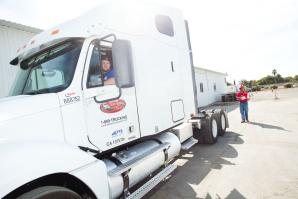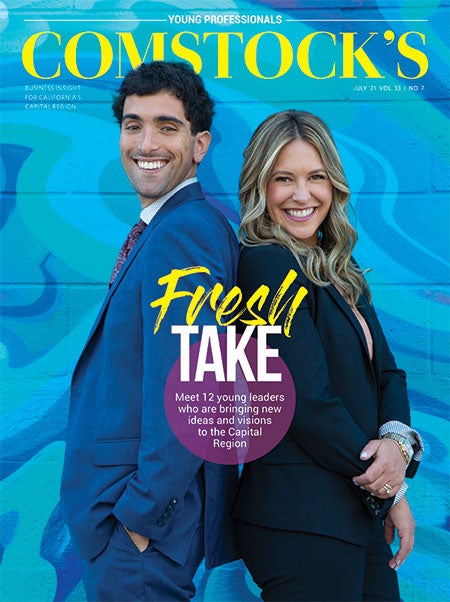Amit Dhugga and Gerardo Aceves
President (Dhugga) and CEO (Aceves), Platinum Express
How do you become a trucking mogul? For Gerardo Aceves and Amit Dhugga, when they were both just 23 years old, in 2015, they bought their first truck — the cheapest they could find — on a credit card. It broke down on their first job. Their cargo was a load of watermelons in the hot California summer, and their client angrily told them, “You guys are going to be delivering watermelon stew. We don’t want watermelon stew!”
Flash forward six years. Their Yuba City-based company Platinum Express, with a fleet of 100 trucks, now hauls lumber, beer, paper, chemicals, dog food, and products that range from toothpaste to sofas across 11 Western states, stocking the shelves of stores like Costco and Target. With stated annual revenue topping $20 million, they plan to double their fleet by the end of 2022. “We didn’t want to build a company, we wanted to build an empire,” Dhugga says.
Both of these friends, now 30, grew up in the Capital Region and have immigrant roots. After moving from India, Dhugga’s father owned restaurants and grocery stores, so the logical move would be for the son to join the family business. Or maybe not. “I didn’t want to be known as the kid who worked for his dad,” Dhugga says. “I wanted to do something on my own.” He first studied biology, then pharmacy, then law before catching the entrepreneurial bug. He even knocked out his law degree from the John F. Kennedy College of Law while co-running Platinum Express, which might make him the only lawyer-turned-trucking-company owner on the planet.
“We didn’t want to build a company, we wanted to build an empire.” Amit Dhugga, president, Platinum Express
Aceves’ parents moved from Mexico to Sacramento in the 1980s and worked on a farm. Aceves says that since he was 5 years old, he had an ambition to “make so much money and do something,” and this drove him to take classes at Yuba College while still in high school, to flip some quick sales on eBay (like jewelry and cell phone parts), and to launch a cell phone company when he was 16.
Neither one of them had ever driven a truck (unheard of in this industry), which led them to ask a ton of questions, consult with smart experts (they’re proud of hiring top drivers) and introduce innovation — such as digitizing the truck scheduling and operations, much of which used to be done on paper or white boards.
And they relentlessly focused on growth. The average company has “five or 10 trucks,” says Aceves, but as soon as they could they leased 10 trucks, then 20, then 30. This let them scale and entice bigger clients, which provided capital to buy their own trucks, which attracted even bigger clients, which soon yielded more trucks and then more clients. They hired aggressively. “Most people would have 40 percent less staff,” says Aceves. The company’s larger staff gives the luxury to quickly scale and ensure quality control and on-time deliveries. Gone are the days of “watermelon stew.”
They started the business to make money — mission accomplished — but they’ve developed a deep pride for the role of trucking. Especially during COVID. In the pandemic’s darkest days, the trucks of Platinum Express delivered face masks, disinfectants, respirators, hand sanitizers and scrubs. “Even when everything is shut down, the truck drivers are working hard,” says Aceves. Or as Dhugga sees it, whenever you walk into a store and look at the items on the shelf, 99 percent of the time, they arrived on a truck. The trucking industry “keeps all the industries afloat,” Dhugga says. “It keeps America moving.”
–
Get all the profiles in our Young Professionals issue delivered to your inbox: Subscribe to the Comstock’s newsletter today!
Recommended For You

Young Professionals Bring New Ideas for a Changing Economy
To open the annual Young Professionals issue, Comstock’s president and publisher considers Capital Region innovation.

American Dreams
Punjabis in California overcame decades of discriminatory laws to build a new home for themselves in Yuba City — and the community flourishes today
As the legend goes, Didar Singh Bains arrived in his new home of Yuba City in 1958 at age 18 with only $8 in his pocket, which was enough for him. A young immigrant from India with humble origins, he says he believed that in the U.S. “money could grow on trees.” In the course of his lifetime, that youthful optimism has proven true — at least figuratively.
The Lonesome Road
America’s trucking industry faces driver shortages
The trucking industry is facing a significant driver shortage as baby boomers retire and younger people are unwilling to replace them.

$30 Million Gamble
Port expansion project has uncertain future
The ports of West Sacramento and Stockton are betting that a $30 million public investment in new infrastructure will convince local importers and exporters to transfer their method of goods movement to the San Francisco Bay from trucking to barge shipping.




